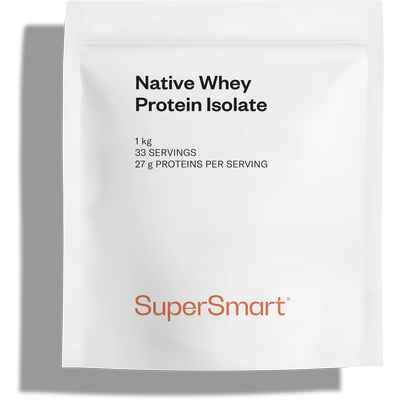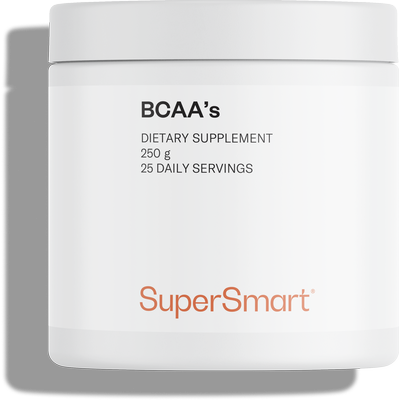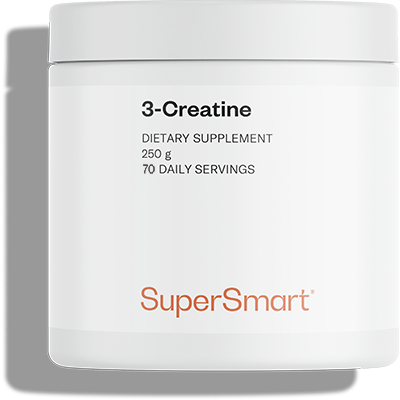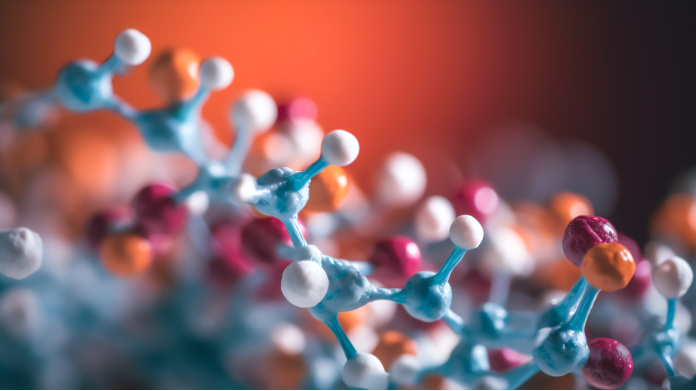When To Take BCAAs: The Right Timing To Optimise Your Performance
BCAAs have become essential for many sportspeople and bodybuilders. But should they be taken before, during or after training? Zoom in on their role and the best strategies for taking advantage of them.

What are BCAAs used for?
BCAAs (Branched-Chain Amino Acids) are essential amino acids which support protein synthesis, ideal when you're doing sport.
They are made up of three essential amino acids: leucine, isoleucine and valine.
These molecules are described as ‘essential’ because our bodies cannot synthesise them: they have to be provided by the diet, mainly via animal proteins (meat, eggs, dairy products) and plant proteins (soya, legumes, oats, wheat, etc.).
Used as building blocks for muscle proteins, these amino acids are involved in tissue repair and the muscle-building process (1).
Leucine is being studied in particular for its role in activating the mTOR signal, which is responsible for muscle production (2).
BCAAs can also contribute to the supply of energy to muscles, particularly when glycogen reserves are depleted during prolonged exercise (3).
They are therefore particularly popular with sportspeople looking to support their muscle mass, recovery and performance.
When should you take BCAAs to optimise your results?
Before, during or after training: there are several strategic times to consider taking BCAAs, depending on your objectives and the type of physical activity you are practising.
Before training: to limit muscle catabolism
Some athletes choose to take BCAAs before their workout in order to:
- limit muscular catabolism by providing amino acids directly available to muscle fibres
- provide a complementary source of energy, particularly useful when training on an empty stomach or during a calorie deficit
This strategy is favoured for preparing muscles for exercise, particularly during intense or prolonged training sessions.
Indeed, studies suggest that taking BCAAs may reduce the muscle damage caused by physical exercise (4).
During exercise: to support physical effort
Others prefer to take BCAAs during exercise, particularly during prolonged efforts (endurance sports, intensive circuits or extreme conditions).
The idea is to reduce perceived effort and the onset of central fatigue by influencing the synthesis of serotonin, a neuromediator involved in the perception of fatigue (5-6).
Consuming BCAAs during physical effort would also have the effect of maintaining a constant supply of amino acids for the muscles involved (7).
These effects have yet to be confirmed by other studies and research, but are already of interest to marathon runners, triathletes and endurance athletes.
After training: to optimise recovery
Taking BCAAs after exercise is often part of a muscle recovery strategy, to:
- promote the repair of muscle fibres stressed and damaged by exercise
- stimulate protein synthesis, supplementing an appropriate post-training protein intake
This is considered to be a 'metabolic window' conducive to the assimilation of nutrients.
Studies suggest that BCAAs could reduce the sensation of muscle soreness in the 24 to 48 hours following exercise, by reducing muscle inflammation and micro-injuries linked to exercise (8).
Some special cases
Some athletes may also take BCAAs on an empty stomach, to limit muscle breakdown during morning training without breakfast: they provide rapidly available amino acids for the muscles, without making digestion more difficult.
Others prefer to take BCAAs during a lean period, when the aim is to reduce body fat while retaining as much muscle mass as possible: BCAAs are used to preserve lean mass despite the calorie deficit.
Endurance sports enthusiasts, on the other hand, prefer to take BCAAs in divided doses during exercise, which could help to sustain performance and delay muscular fatigue (particularly during long competitions) (9).
BCAAs: how do you choose them?
While a balanced diet is normally sufficient to cover BCAA needs, targeted supplementation can also be considered to support sporting activity.
What forms of BCAA should I choose?
BCAAs come in a variety of forms to suit individual preferences and routines:
- powders: easy to dissolve in water or a sports bottle, they facilitate a gradual intake during exercise (they are often preferred for endurance sessions)
- capsules or tablets: easy to carry around, they can be taken quickly before or after the session
- ready-to-use drinks: often enriched with electrolytes, these can also help maintain hydration
Warning: always take the time to check the quality of the ingredients, and the presence of artificial flavourings, sweeteners or unnecessary additives.
What ratio should I choose?
BCAA food supplements have three-digit ratios (2:1:1, 4:1:1 or 8:1:1), which indicate the proportion of leucine:isoleucine:valine in the product.
The 2:1:1 ratio is the most widespread: it corresponds to the natural distribution of leucine, isoleucine and valine in the muscles.
This balanced ratio is generally well tolerated.
![]() Discover BCAA's, a pure and perfectly balanced formula to support your training. This high-quality supplement is made from sunflower lecithin, and is offered in its purest possible form, unflavoured and unsweetened.
Discover BCAA's, a pure and perfectly balanced formula to support your training. This high-quality supplement is made from sunflower lecithin, and is offered in its purest possible form, unflavoured and unsweetened.
Can BCAAs be combined with other supplements?
BCAAs can be combined with other food supplements, with a view to performance, recovery or muscle development.
Whey, for example, is an excellent source of protein and is very popular with athletes. It is used to easily and effectively meet the high protein needs of people looking to strengthen and develop their muscles.
![]() Discover Native Whey Protein Isolate, a high-quality native whey isolate.
Discover Native Whey Protein Isolate, a high-quality native whey isolate.
Another common synergy: creatine. Naturally present in muscle fibres, this amino acid derivative is involved in energy production during short-duration, high-intensity exercise.
![]() Discover 3 Creatine, a powerful, synergistic blend of 3 active forms of creatine.
Discover 3 Creatine, a powerful, synergistic blend of 3 active forms of creatine.
SUPERSMART ADVICE
References
- Weber MG, Dias SS, de Angelis TR, Fernandes EV, Bernardes AG, Milanez VF, Jussiani EI, de Paula Ramos S. The use of BCAA to decrease delayed-onset muscle soreness after a single bout of exercise: a systematic review and meta-analysis. Amino Acids. 2021 Nov;53(11):1663-1678. doi: 10.1007/s00726-021-03089-2. Epub 2021 Oct 20. PMID: 34669012.
- Duan Y, Li F, Li Y, Tang Y, Kong X, Feng Z, Anthony TG, Watford M, Hou Y, Wu G, Yin Y. The role of leucine and its metabolites in protein and energy metabolism. Amino Acids. 2016 Jan;48(1):41-51. doi: 10.1007/s00726-015-2067-1. Epub 2015 Aug 9. PMID: 26255285.
- Kamei Y, Hatazawa Y, Uchitomi R, Yoshimura R, Miura S. Regulation of Skeletal Muscle Function by Amino Acids. 2020 Jan 19;12(1):261. doi: 10.3390/nu12010261. PMID: 31963899; PMCID: PMC7019684.
- Howatson G, Hoad M, Goodall S, Tallent J, Bell PG, French DN. Exercise-induced muscle damage is reduced in resistance-trained males by branched chain amino acids: a randomized, double-blind, placebo controlled study. J Int Soc Sports Nutr. 2012 Jul 12;9:20. doi: 10.1186/1550-2783-9-20. PMID: 22569039; PMCID: PMC3395580.
- Blomstrand E. Amino acids and central fatigue. Amino Acids. 2001;20(1):25-34. doi: 10.1007/s007260170063. PMID: 11310928.
- Meeusen R, Watson P. Amino acids and the brain: do they play a role in "central fatigue"? Int J Sport Nutr Exerc Metab. 2007 Aug;17 Suppl:S37-46. doi: 10.1123/ijsnem.17.s1.s37. PMID: 18577773.
- Shimomura Y, Murakami T, Nakai N, Nagasaki M, Harris RA. Exercise promotes BCAA catabolism: effects of BCAA supplementation on skeletal muscle during exercise. J Nutr. 2004 Jun;134(6 Suppl):1583S-1587S. doi: 10.1093/jn/134.6.1583S. PMID: 15173434.
- Salem A, Trabelsi K, Jahrami H, AlRasheed MM, Boukhris O, Puce L, Bragazzi NL, Ammar A, Glenn JM, Chtourou H. Branched-Chain Amino Acids Supplementation and Post-Exercise Recovery: An Overview of Systematic Reviews. J Am Nutr Assoc. 2024 May-Jun;43(4):384-396. doi: 10.1080/27697061.2023.2297899. Epub 2024 Jan 19. PMID: 38241335.
- Kim DH, Kim SH, Jeong WS, Lee HY. Effect of BCAA intake during endurance exercises on fatigue substances, muscle damage substances, and energy metabolism substances. J Exerc Nutrition Biochem. 2013 Dec;17(4):169-80. doi: 10.5717/jenb.2013.17.4.169. Epub 2013 Nov 28. PMID: 25566428; PMCID: PMC4241904.
Keywords
4 Days
very good expereince
very good expereince
Jelena Đaković
4 Days
Very good products.
Very good products.
Agnes BENDSAK
6 Days
Just OK
Just OK, ordering from company for many years and being safisfied
Lynn Mae
7 Days
Recomendo
Produtos encomendados são recebidos atempadamente e de acordo com o anunciado! Muito satisfeita!
Carla Sofia
7 Days
Everything is great!
Everything is great!
Jonas
12 Days
The delivery was fast and the product…
The delivery was fast and the product is great
SOMMARIVA Gianni
13 Days
Great service and lots of information
Great service and lots of information
Gabi
16 Days
Service Satisfaction
I’m satisfied with the service; it fulfilled what it set out to do.
Anfhony Abreu
19 Days
Original product and fast delivery
Original product and fast delivery. I haven't started it yet, but will do soon.
Vincenza Catania
22 Days
Good quality
Good quality. Good service.
Leonel Guzman
24 Days
Top!!!!!!!!
Top!!!!!!!!
Michael
26 Days
Excellent!
Products are great and delivered fast!
PARDINI Debora
26 Days
From order to receive the product
From order to receive the product, the process is smooth & fast. It’s good to customers.
WONG Mei Ling
28 Days
Fast delivery
very quick delivery to italy. product is good.
Customer
29 Days
Prompt delivry !!👍
Prompt delivry !!👍
SWEET Christine
of experience
your money back
##montant## purchase







